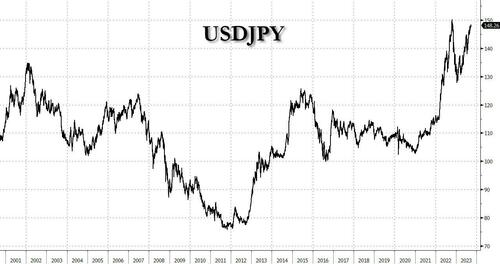Several factors feed into this complex issue. One geopolitical pundit recently voiced the opinion / commented that the Japanese would not abandon the yen based on the idea of loyalty and pointed out that the culture of Japan is different from that of other countries. I beg to differ with his assessment and stand by a statement I wrote years ago:
When investors in Japan's government bonds begin to believe that Abenomics will be successful in bringing back inflation it would be logical for owners of JGBs to move out of low-yielding securities and buy foreign bonds or equities. The moment the Japanese stock market fails to rise enough to offset a falling yen and inflation this will turn into a tsunami of money fleeing Japan and constitute the end of the line for those left holding both JGBs and the yen.
It is very likely that the yen will only fail once, and it is impossible to predict when or how fast it will occur once it starts. Japan must move on. Japanese Prime Minister Shinzo Abe is gone, and the long-time Governor of the Bank of Japan (BOJ) Kuroda Haruhiko has stepped down. Japan is in a situation where the BOJ may view ending its easing cycle remains too terrifying to even start. The BOJ can never stop yield curve control and it is costing the BOJ a fortune. The BOJ has become Japan's long-term bond market.
During his press conference following a recent policy announcement, the new BOJ governor Kazuo Ueda, clarified that the “distance to ending negative rates” hasn’t really changed. He explained he had simply wanted to avoid ruling anything out and limiting the BOJ’s options. Ueda reiterated that when the goal of sustained 2% inflation is in sight, the BOJ will consider ending its YCC policy as well as raising interest rates. Kuroda's successor said that the BOJ has long placed a greater emphasis on the risk of tightening too soon over the possibility of being behind the curve in raising rates.
Ueda says there’s no change to this “risk management” tendency. Speaking of the currency, Ueda said it’s desirable for currency rates to reflect economic fundamentals and to move in a stable fashion. Udea declined to comment on "short-term" currency moves, which have seen the yen plunge. The yen has been the Developed World's Turkish lira this year. It has cratered from 130 to 148, weakened even more on what was widely seen as a dovish BOJ stance. This drop has been restrained by comments from government officials that they are ready to act on sharp moves.
Of course, in the end, intervention to support the yen will be the call of Japan's Minister of finance and not the BOJ. Still, the BOJ has no other choice than to be "fully aboard" such a decision. This is a political call that has market watchers thinking a burst of FX intervention will occur here around the 150 level. This has created the notion that risk-reward doesn’t favor being long USD/JPY at current levels.
Japan's
long-suffering population can sustain only so much inflation and will demand a different PM if the
current one is willing to risk currency collapse just to preserve fake
bond market stability for a little longer. History has proven this does not work. Soaring inflation has been above the 2% inflation target
since April 2022, and even above US CPI at times.
 |
| The Yen Is Nearing What Some Currency Traders View As The Critical 150 Mark |
A country can always drive its currency downward, however, supporting it is much more difficult. To drive a currency lower a country only needs to print and sell its currency using it to buy one or more of the other three reserve currencies. With this in mind, remember in recent years, part of the yen's strength seen may be attributed to the fact Japan had strong economic ties to the strong Chinese economy. Today, the collapsing economy in China has become a drag unless you are factoring in the idea wealthy Chinese are using business ties to move wealth out of China. This tight relationship can be seen each time trouble surfaces in China's economy. When this happens the yen rises in value as wealth exits China through business back-channels.
Returning to the idea the Japanese people may at sometime bolt and throw the yen under the bus, add into this mix is Japan's huge carry trade in which many citizens are now participating. Planet Finance, recently posted a video focused on the growing number of retail traders in Japan. Knowing they won't get interest on their savings for decades creates a low threshold for the one-and-a-half million Japanese individuals in this dangerous and volatile market.
Footnote; The next post will focus on how China's deepening economic woes are likely to impact Japan's fragile economic recovery.
(Republishing this article is permitted with reference to Bruce Wilds/AdvancingTime Blog)

I'm continuing to hear that the Japanese have money-making investments around the world and its trade deficit is not huge. I contend this has all been factored in. Most Japanese have little interest in throwing themselves under the bus to save the yen.
ReplyDeleteWould the USA mind if JPY devalued and took out CNY in the process? Both countries are too large for a bailout, but the USA could aid Japan with favorable policy while slapping tariffs on a devalued yuan. If CNY goes first, USA will blame a subsequent JPY collapse on China. If JPY goes first, the USA will say China is exploiting the situation. This is all probably happening with or without planning.
ReplyDeleteAt 21 minutes and 43 seconds into this video, interest rate specialist James Grant talks about the situation brewing in Japan. Here is the link, https://www.youtube.com/watch?v=uoGdmrmqiBc
ReplyDelete